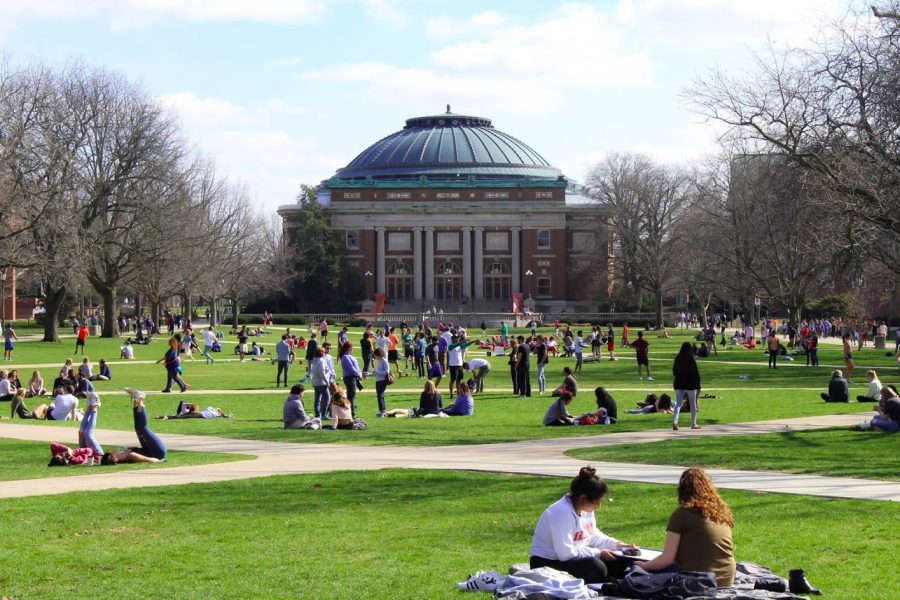COVID-19 briefing series: University addresses budget, finance concerns
Crowds gather on the main quad to enjoy the weather during Mom’s Weekend on April 6, 2019.
Jun 5, 2020
The University has created a COVID-19 briefing series that discussed budget and finance concerns on a live stream.
Chancellor Robert Jones, Provost Andreas Cangellaris, and Associate Chancellor for Budget and Resource Planning Paul Ellinger were the panelists for the briefing and answered questions submitted by members on campus.
There were three major fields that affected the financial integrity of the University and the distribution of funding for certain units was explained by Paul Ellinger.
“There were fee adjustments and refunds we had made in some of our programs; we were about halfway through our spring semester when this happened, so we made approximately 50% fee adjustments for our students,” Ellinger said.
These fees and refunds included housing, food service, student service fees, parking fees, 4H camps and cost around $36.6 million
Get The Daily Illini in your inbox!
Additional costs were also added since classes were moved online, and the University had to adapt to the new learning environment and accommodate students, which cost a total of $10.6 million.
“We immediately went out and purchased hardware for students and staff to make sure that we could go online effectively and work remotely effectively, we also purchased new software for online delivery, COVID-19 research, support for graduate fellowships, and summer online teaching,” Ellinger said.
The lost revenue came out to be $33.9 million as the University had to cancel many summer programs and had to adjust tuition for summer classes.
“We were very fortunate to receive CARES funding, approximately $31.4 million; the requirement was that half of it was to be used for students in an emergency fund, and the other half we were allowed to use for some of our institutional support,” Ellinger said.
In order to improve finances for students approximately $12 million will be invested into the Emergency CARES program and another $5 million will be used to support graduate fellowships for the summer to aid students who may be unable to return to campus.
There were various solutions and strategies that were implemented due to the COVID-19 financial impact such as eliminating merit-based salary programs for the upcoming academic year, postponing capital projects, recurring budget reductions for centrally-budgeted units and cash recessions.
“Cash recessions for all units would make units to put some money aside, comparable to putting it into a savings account, that they can’t use for other resources with the idea that we can use it to fill some of the gaps that may occur,” Ellinger said.
The University will prioritize campus community members health and wellness as well as improving online course delivery for the upcoming academic semester.
“We are launching on Tuesday of next week (June 16) something called the Summer Online Teaching Academic, which is to learn from some of the activities and best practices to enhance our ability to blend into an online learning environment,” Ellinger said.
The financial aid department is continuing their communication with students concerning tuition requirements and support they may be eligible for in order to aid them during the pandemic.
“We have established the Illinois Commitment, and I know it is making a significant difference in many of the students because of their change in their financial status due to the COVID-19 crisis,” Cangellaris said. “We had extended to them the opportunity to let us know about changes with their families financial wellbeing as we consider what support they would need to continue to attend the University.”
In terms of athletics the University is still in the midst of planning out a decision for the football program in particular and will be having a meeting with other Big Ten schools in the future for detail.
“We have made the decision to bring about 150 students back to campus on a voluntary basis, not to begin practice but to begin training, because you cant have students practice if they haven’t had conditioning done,” Jones said.
The University is continuing to plan the upcoming academic semester by communicating with various units and programs on campus in order to ensure that the year can go smoothly during the pandemic.
“We must expect that the financial impact from COVID-19 will affect all major revenue and all campus units across all of our admissions,” said Chancellor Jones. “If final implications will have lingering effects we must begin to consider scenarios for how we mitigate physical challenges and how we will implement a recovery plan for this university as these implications will occur for several years to come.”






